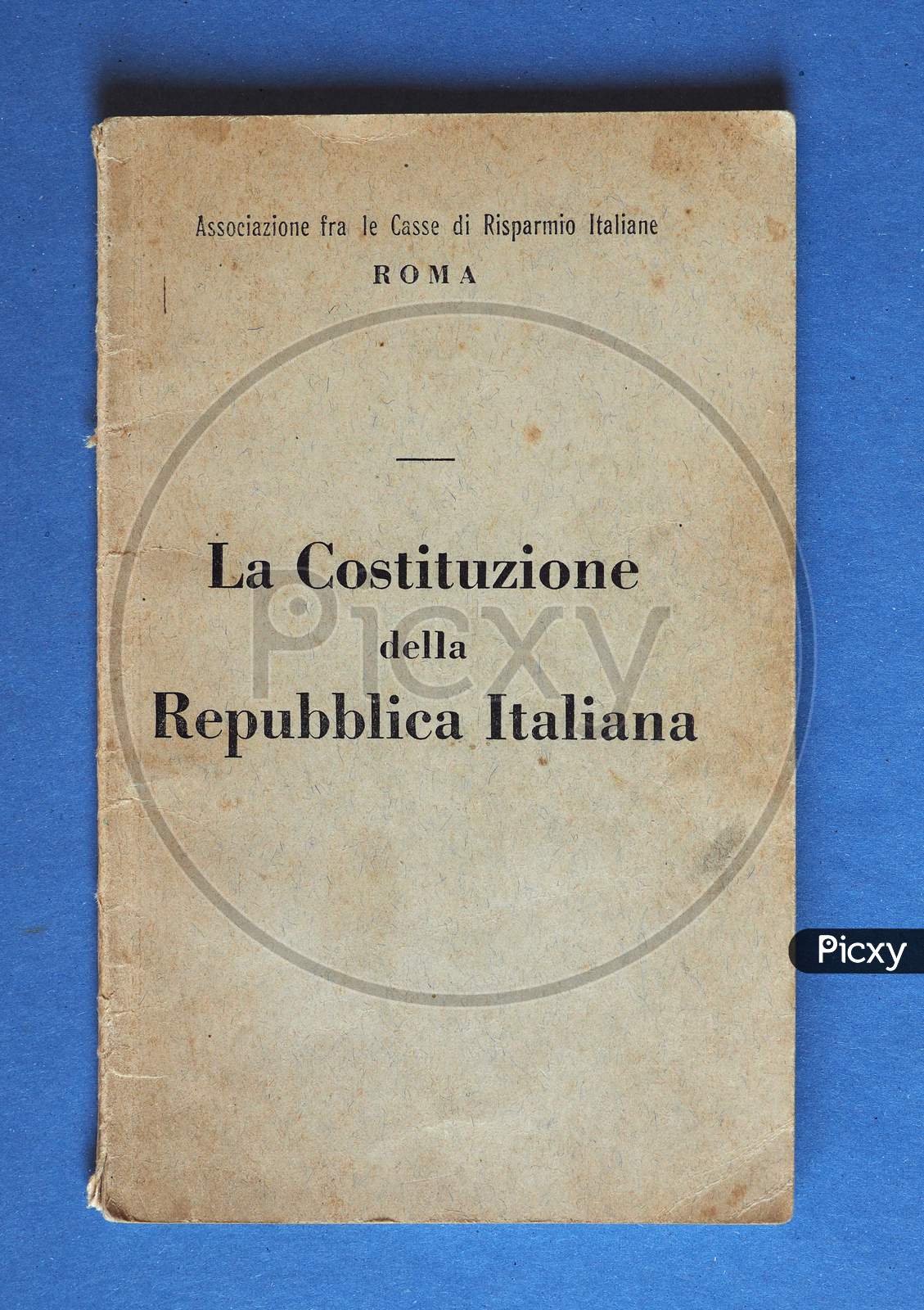The Italian Constitution: A Cornerstone Of Democracy And Human Rights is regarded as one of the most important legal documents in the history of modern Italy.
Editor's Notes: "The Italian Constitution: A Cornerstone Of Democracy And Human Rights" published today, dated MM/DD/YYYY. This Constitution is a vital document that has shaped Italian society and guaranteed the rights and freedoms of its citizens. Understanding this document is crucial for comprehending the foundation of Italian democracy and its commitment to human rights.
Through extensive analysis and research, we have compiled this comprehensive guide to provide valuable insights into the significance of the Italian Constitution. It outlines the key principles, historical context, and lasting impact of this remarkable document.
| Key Differences | Key Takeaways |
|---|---|
| Historical Significance | Established after World War II to break away from Fascist rule and establish a democratic republic |
| Fundamental Rights | Guarantees basic rights and freedoms, including freedom of speech, religion, and assembly |
| Structure | Divided into three parts: Fundamental Principles, Fundamental Rights and Duties of Citizens, and the Organization of the Republic |
| Influence | Inspired constitutional developments in other countries and served as a model for international human rights law |
The Italian Constitution has played a pivotal role in shaping the country's political, social, and cultural landscape. Its enduring legacy as a cornerstone of democracy and human rights continues to inspire and guide Italian society today.

Daniel Caspary on Twitter: "🇹🇼 Just met with the Ambassador of - Source twitter.com
FAQ
This section addresses commonly asked questions regarding the Italian Constitution and its significance in safeguarding democracy and human rights.
Question 1: When was the Italian Constitution adopted?
Answer: January 1, 1948
Question 2: Who was responsible for drafting the Constitution?
Answer: A constituent assembly elected by the people
Question 3: What are the fundamental principles enshrined in the Constitution?
Answer: Sovereignty, indivisibility, democracy, equality, and social justice
Question 4: How does the Constitution protect human rights and freedoms?
Answer: Through an extensive Bill of Rights, including the right to life, liberty, religious freedom, and due process
Question 5: What role does the Constitutional Court play?
Answer: Guardians and interpreters of the Constitution, ensuring the validity of laws
Question 6: How has the Constitution shaped Italian democracy?
Answer: Fostering a stable and democratic republic with a strong focus on protecting individual rights and freedoms

Human Rights | Human rights day, Human rights, Childrens rights - Source www.pinterest.com
In conclusion, the Italian Constitution stands as a testament to the enduring principles of democracy and human rights, providing a solid foundation for a just, equitable, and free society for all.
To learn more about the Italian Constitution and its enduring legacy, explore the following sections:
Tips
The Italian Constitution is a cornerstone of democracy and human rights. It guarantees a wide range of fundamental freedoms, including the right to life, liberty, and property. It also establishes the separation of powers and the independence of the judiciary.
Tip 1: Understand the basic principles of the Italian Constitution.
The Italian Constitution is based on the principles of popular sovereignty, democracy, and the rule of law. It riconosce the fundamental rights and freedoms of all citizens and establishes the separation of powers among the legislative, executive, and judicial branches of government.
Tip 2: Know your rights under the Italian Constitution.
The Italian Constitution guarantees a wide range of rights and freedoms, including the right to life, liberty, and property. It also protects freedom of speech, religion, and assembly.
Tip 3: Participate in the political process.
The Italian Constitution encourages citizens to participate in the political process. You can vote in elections, run for office, or join a political party.
Tip 4: Respect the rule of law.
The Italian Constitution is the supreme law of the land. All citizens are required to obey the law and respect the rights of others.
Tip 5: Promote democracy and human rights.
The Italian Constitution is a living document that must be constantly defended and promoted. You can do your part by speaking out against injustice and supporting organizations that promote democracy and human rights.
The Italian Constitution is a powerful tool that can be used to protect your rights and freedoms. By understanding the Constitution and your rights under it, you can help to ensure that Italy remains a democracy that respects the rule of law and human rights.
For more information, visit The Italian Constitution: A Cornerstone Of Democracy And Human Rights
The Italian Constitution: A Cornerstone Of Democracy And Human Rights
The Italian Constitution of 1948 is recognized not only as the foundational legal framework of the Italian Republic but also as a beacon of democratic values and the protection of human rights. It has served as a model for constitutions worldwide and continues to safeguard the fundamental freedoms and dignity of all citizens.

Image of Rome, Italy - Circa December 2016: La Costituzione Della - Source www.picxy.com
- Fundamental Rights: Guarantees basic freedoms such as freedom of speech, assembly, and religion.
- Popular Sovereignty: Affirms the power of the people to govern themselves through elected representatives.
- Division Of Powers: Distributes governmental authority among different branches to prevent tyranny.
- Constitutional Review: Provides a mechanism to amend the Constitution, ensuring its adaptability to changing societal norms.
- International Cooperation: Embraces the principles of international law and cooperation, promoting peace and human rights globally.
- Rigidity: Requires a special majority for amendments, protecting the Constitution from impulsive or arbitrary changes.
These key aspects collectively form the backbone of the Italian Constitution, ensuring that it remains a cornerstone of democracy and human rights. Its principles continue to guide the nation's laws and policies, shaping a society where individual freedoms, the rule of law, and the well-being of all citizens are paramount.
The Italian Constitution: A Cornerstone Of Democracy And Human Rights
The Italian Constitution, adopted in 1948, is a fundamental document that has shaped the nation's political and legal landscape. It is considered a cornerstone of democracy and human rights, serving as a guarantor of fundamental freedoms and individual rights for all citizens.

Human Rights in Indian Constitution - Basic Characters & Overview - Source legodesk.com
This Constitution has played a central role in establishing Italy as a modern democratic republic, ensuring the separation of powers, the protection of civil liberties, and the promotion of social justice. It includes a comprehensive bill of rights that enshrines key principles such as freedom of speech, religion, and assembly. Moreover, it establishes the fundamental principles of equality before the law, due process, and the right to a fair trial.
The Italian Constitution has not only served as a cornerstone of domestic legal and political order but has also had a significant influence internationally. Its principles and provisions have inspired constitutional frameworks in other countries and have contributed to the development of international human rights law.
The study of the Italian Constitution is of paramount importance for understanding the historical evolution of Italy's democratic institutions and its commitment to protecting individual rights. By examining its genesis, provisions, and impact, we gain insights into the foundations of a modern constitutional democracy and the enduring principles that have shaped Italian society.
Conclusion
In conclusion, the Italian Constitution stands as a testament to the enduring power of democracy and human rights. Its principles have not only transformed Italy into a modern, democratic republic but have also served as a model for constitutionalism around the world. The study of this Constitution provides valuable lessons for understanding the essential elements of a democratic society and the importance of protecting individual rights and freedoms.